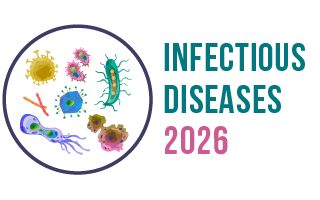4th International Conference on
Infectious Diseases
September 09-10, 2026 | Barcelona, Spain

Infectious Diseases 2026

University of Agriculture, Pakistan
Abstract:
More than 50 million cattle population is present in Pakistan which are reared for dairy and meat purpose. This animal is susceptible to various parasitic infections and a very scarce data is available regarding the impact of parasitic infection on reproduction and production of dairy cattle. Therefore, present study was designed to determine the molecular epidemiology of Theileria and Babesia and their effect on reproduction and production. Briefly, 384 blood samples of exotic breed, crossbred and local breed of cattle were collected from population of two tehsils of Faisalabad district i.e., Chak Jhumra and Saddar Faisalabad using simple random sampling method. The information regarding associated risk factors were inquired from farmers through a pre-designed questionnaire. DNA was extracted from these blood samples through Wiz Prep gDNA kit followed by screening of samples using genus specific PCR primers. Their effects on milk production and reproductive performance (length of estrous cycle) were also evaluated. The values derived from the experiment were assessed by using multiple logistic regression. The overall prevalence noted of Babesia and Theileria species in tehsil Saddar and Chak Jhumra were 28.72% & 30.04% and 18.23% and 22.66%, respectively. Infection was found higher in emaciated, female animals more than five years of age during rainy season. Prevelance of Babesia and Theileria had major impact on production and reproduction parameters of dairy cattle as animals with infection of these blood parasites decrease milk production day by day after the infection occurs
Biography:
Dr. Muhammad Kasib Khan have completed his PhD in Preventive Veterinary Medicine with subject of Molecular Parasitology from Huazhong Agricultural University located at Wuhan, P.R. China in 2013. After completion of his Ph.D., he joined the Department of Parasitology, UAF as Lecturer in January 2014 and was promoted as Assistant Professor on TTS in the same Department in April, 2014. Currently, he serving as Tenured Associate Professor (w.e.f. 28.10.2021) in the same Department and Inchrage of Epidemiology Laboratory. His research expertise are (1) Molecular surveillance of parasites infecting human and livestock population in Pakistan, especially opportunistic parasites in immunocompromised individuals like HIV, (2) Molecular identification and control of food and water borne parasites infecting humans and livestock population.
